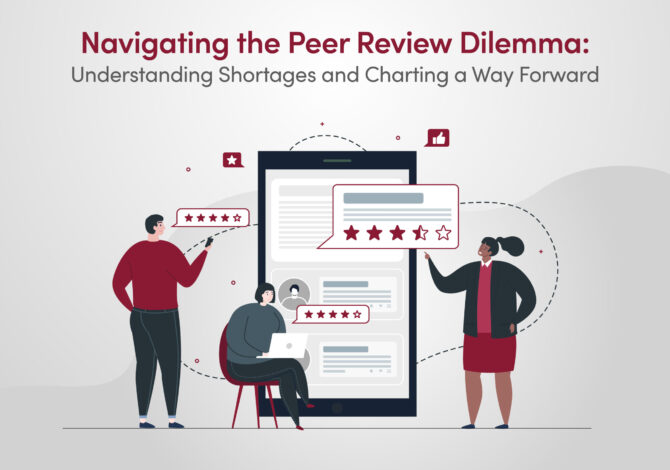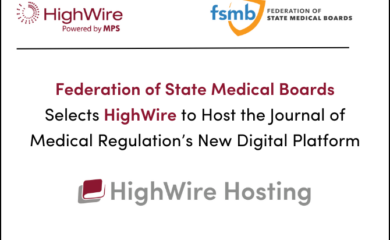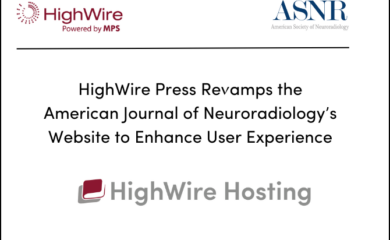One of the most important objectives for scholarly publishing is to validate scholarship. Scientists, researchers and scholars review each other’s work, reporting back on what they find to be deficient and suggesting ways to make it better. The authors provide the raw material, the editorial staff process the raw material, and the editors and reviewers refine the raw material. Reviewers are an essential ingredient in peer review, after all it is they who give the whole entity its name, however, they are exceedingly difficult to come by. The role of the reviewer is to provide advice and guidance to the editor, and arguably their contribution is the most important of all of the players, the reviewer is also the least vested in the research, as they are doing the work for free and in most cases their contribution is anonymous.
As the academic landscape expands and evolves, the peer review system confronts unprecedented challenges. The surge in research submissions, coupled with the evolving dynamics of the scholarly community, has brought to light a pressing concern: a noticeable scarcity of available and dedicated reviewers. Consider this – over 70% of scholars turn down review invitations due to the article not aligning with their specialization, while 42% feel overwhelmed with other commitments, and 39% lack formal training in peer-reviewing.
This emerging predicament not only poses logistical challenges but also beckons a deeper introspection into the future of peer review.
The Current State of Peer Review
An Unprecedented Influx in Scholarly Submissions
Particularly in disciplines such as medicine and technology, there’s been a marked increase in research submissions. This surge represents the rapid advancements in these fields and the global imperative to disseminate new knowledge. However, this proliferation of research brings forth a critical challenge: the adequacy of the peer review system to maintain the integrity and quality of these submissions.
Dealing with ‘Reviewer Fatigue’
Researchers, amidst their primary academic and research responsibilities, are dedicating substantial time to the review process. This intensive commitment has given rise to what is now termed “reviewer fatigue.” The Global State of Peer Review report by Publons (2018) provided stark insight into this issue. With over 11,000 researchers surveyed, the findings were unequivocal: the fatigue among reviewers is intensifying, compelling journal editors to expand their search radius for competent reviewers. Further, just 10% of reviewers handle half of all peer reviews.
Challenges Confronting Journal Editors
For journal editors, the evolving landscape presents multifaceted challenges. Beyond the immediate task of identifying proficient reviewers, there lies the complex challenge of retaining them for subsequent reviews. Balancing the rigor of the review process while ensuring reviewers are not overburdened is a delicate equilibrium that editors strive to achieve. The limited availability of reviewers often culminates in longer review durations, potential compromises in the review’s adequacy, and occasionally necessitates difficult editorial decisions regarding the progression of submissions.
Understanding the Causes
Increasing volume of submissions
The scholarly community is experiencing an unprecedented rise in research output. This is not merely a reflection of academic vigor but a testament to the global emphasis on advancing knowledge. Especially in newer fields like bioinformatics or sustainable technologies, there’s a palpable eagerness to contribute, collaborate, and communicate findings.
The sheer volume of research articles being published worldwide has seen a significant uptick over the past few decades. Such a voluminous influx of submissions invariably exerts pressure on the peer review mechanism, demanding more reviewers and more time.
The Incentive Dilemma for Reviewers
Historically, the act of peer review has been viewed as a voluntary service to the academic community, driven by a sense of duty and the intrinsic value of upholding research integrity. However, the absence of tangible rewards or formal recognition often leaves reviewers feeling undervalued. While the intrinsic value of contributing to one’s field is undeniable, the lack of external incentives can sometimes overshadow this sentiment, especially when reviewers grapple with their primary academic responsibilities.
The Untapped Potential of Early-Career Researchers
Early-career researchers (ECRs) represent a reservoir of untapped potential in the peer review process. Armed with fresh perspectives, updated methodologies, and a keenness to contribute, they could significantly bolster the reviewer pool. However, they often face barriers, from lack of opportunities to apprehensions about their reviews being undervalued.
In essence, while the peer review system grapples with the challenges of volume and reviewer motivation, there lies an opportunity to integrate and mentor the next generation of researchers, ensuring the process remains robust and resilient.
The Need for Diverse Voices in Peer Review
Researchers from developed nations contribute to peer reviews at a rate three times higher per submitted paper than their counterparts in emerging countries. When a range of voices evaluates research, the outcome is a richer, more nuanced understanding of the work. This diversity is not just a matter of fairness; it’s essential for the depth and breadth of the review process.
Having a diverse group of peer reviewers means more than just a mix of genders or ethnicities. It’s about embracing a wide array of academic backgrounds, methodologies, and ways of thinking. When a manuscript is examined by reviewers from varied backgrounds, it undergoes a comprehensive assessment, ensuring its relevance and rigor across different contexts.
However, achieving this diversity is easier said than done. Historically, many journals have relied on a familiar set of reviewers, often sidelining voices from less represented backgrounds.
Broadening the Reviewer Pool
Some journals are actively working to change this. Take, for instance, the Nature journals have made a public diversity commitment to foster diversity in peer review processes. Their aim is not just to ensure fairness but to enhance the quality and comprehensiveness of reviews. By tapping into a diverse pool of reviewers, they’re ensuring that research is evaluated from multiple perspectives, enriching the feedback provided to authors.
Taylor & Francis, another major player in the publishing arena, has been vocal about the importance of diverse voices in peer review. They believe that diversity, be it in terms of career stages, geographies, genders, or ethnicities, leads to better decision-making. To this end, they have been actively seeking reviewers from different backgrounds. One of their notable initiatives includes “Peer Review Mentoring,” where early-career researchers, especially those from underrepresented groups, are paired with experienced reviewers. This not only diversifies the reviewer pool but also ensures that emerging scholars are equipped with the skills needed for effective peer review.
Potential Solutions to Reinvent the Peer Review Process
The foundation of scholarly publishing, the peer review system, is confronting numerous challenges. Yet, every challenge brings forth avenues for inventive solutions. Here’s a closer look at potential strategies.
Training Initiatives for Budding Researchers:
The world of academia is brimming with enthusiastic, early-stage scholars ready to make their mark. However, many find themselves adrift when faced with the intricacies of the peer review process. Tailored training initiatives can be the compass they need. Offered by universities or publishing entities, these initiatives encompass hands-on sessions, real-world examples, and guidance from seasoned reviewers.
For instance, the ACS Reviewer Lab offers a comprehensive course that covers the basics of peer review, ethical considerations, and manuscript evaluation techniques. Participants learn how to deal with ethical issues, recognize potential conflicts of interest, and write clear, quality reviews that are useful to both editors and authors.
Similarly, PREreview provides a variety of training workshops, focusing on issues of equity, diversity, and inclusion. Participants learn how to provide clear, constructive, and actionable feedback while identifying and mitigating personal bias.
As observed in the Publons Global State of Peer Review 2018 report, “when reviewers are asked, a vast majority (85%) find recognition and training will improve the efficacy of peer review and that universities and research funders should explicitly require and recognize the reviewing work which should be career enhancing.”
Embracing the Open Peer Review Model:
While the conventional anonymous peer review has its merits, there’s a growing call for increased openness. Open peer review, characterized by disclosed identities of authors and reviewers, promotes this transparency. It fosters a spirit of collaboration, transforming reviews into constructive dialogues. However, it’s pivotal to ensure that emerging researchers can candidly provide feedback without apprehensions.
AI’s Role in Preliminary Manuscript Assessment:
Sophisticated algorithms can adeptly pair manuscripts with potential reviewers based on mutual research interests and prior works. This not only accelerates the process but ensures the manuscript is assessed by a subject-matter expert. Further, implementing definitive timelines for reviews can bolster efficiency.
The initial manuscript assessment stages are ripe for tech intervention. AI-driven tools can swiftly scan submissions against set criteria. These tools can provide research integrity checks (e.g., Clear Skies, Imagetwin), methodology analysis (e.g., SciScore), reference quality reports (e.g., Scite), and compliance checks (e.g., Convey). These tools save the reviewers time by providing information that would normally take a reviewer much longer to ascertain, as well as reveal issues that the reviewer might not have discovered at all. .
Platforms Pioneering the Review Evolution:
- Championing Reviewer Recognition: The academic realm needs to acknowledge reviewing as a pivotal contribution. Platforms like ORCID and ReviewerCredits are spearheading this movement, offering reviewers a platform to chronicle their contributions and ensuring these efforts are lauded.
- Publons: Publons offers a platform for scholars to chronicle their review contributions. Their annual peer review accolade further emphasizes the significance of reviewing in academia.
- Innovative Reviewer Matching Tools: Given the sheer volume of research outputs, zeroing in on the apt reviewer can be daunting. Platforms likeGlobalCampus and Prophy simplify this with their matching algorithms, ensuring every manuscript finds its ideal reviewer.
The Way Forward: Upholding the Gold Standard of Academic Excellence
Collaboration Across the Board:
The essence of a robust peer review system lies in the collective efforts of its stakeholders. Publishers, academic institutions, and researchers must collaborate by pooling their expertise and resources. Such collaborations can lead to the development of shared databases of potential reviewers, co-created training modules for early-career researchers, and joint initiatives to recognize and reward reviewers. When the entire scholarly community collaborates, the challenges facing peer review can be addressed more effectively.
Promoting Interdisciplinary Research:
Today’s global challenges, from environmental concerns to health crises, transcend traditional academic boundaries. As research begins to bridge various disciplines, it’s imperative to diversify the group of manuscript evaluators. By fostering such cross-disciplinary collaboration, we ensure that research papers undergo a multifaceted critique, enriching their overall quality.
Honoring the Review Process:
Historically, the significance of peer review in scholarly circles has been overshadowed in institutional assessments. This paradigm needs a shift. Institutions should prioritize and reward the diligent efforts of those who undertake reviews. By introducing tangible benefits for those involved in the review process, we can galvanize a broader segment of the academic community to commit to this vital task.
As we look ahead, the goal of peer review should remain front and center: maintaining research integrity and validating science. By coming together as a community, embracing change, and valuing every voice in the process, we can ensure that peer review remains a robust and resilient guardian of academic integrity.



